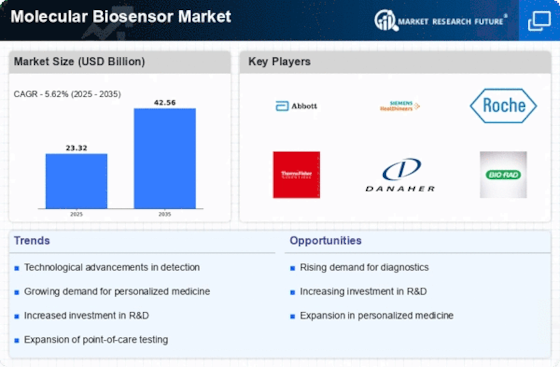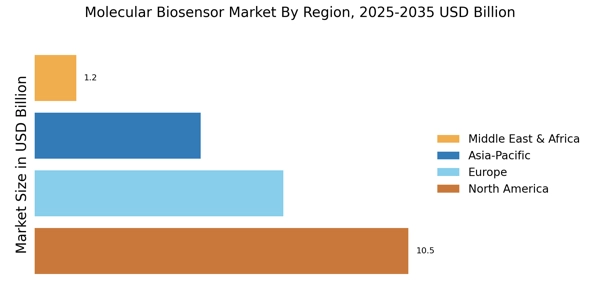Advancements in Nanotechnology
Advancements in nanotechnology are playing a crucial role in shaping the Molecular Biosensor Market. The incorporation of nanomaterials into biosensors enhances their performance, sensitivity, and specificity. Nanotechnology allows for the development of smaller, more efficient biosensors that can detect minute concentrations of target analytes. This is particularly relevant in applications such as early disease detection and environmental monitoring. The market for nanotechnology-based biosensors is projected to witness substantial growth, with estimates suggesting a market size increase of over 15% in the coming years. As researchers continue to explore innovative nanomaterials, the potential for novel biosensor applications within the Molecular Biosensor Market appears promising.
Increasing Applications in Food Safety
The increasing applications of molecular biosensors in food safety are driving growth in the Molecular Biosensor Market. As foodborne illnesses continue to pose significant health risks, the demand for rapid and accurate detection methods is escalating. Molecular biosensors offer the capability to identify pathogens and contaminants in food products swiftly, ensuring consumer safety. The food safety testing market is projected to grow at a rate of approximately 8% annually, reflecting the rising awareness of food quality and safety standards. This trend is likely to bolster the adoption of molecular biosensors in the food industry, thereby enhancing the overall market landscape within the Molecular Biosensor Market.
Rising Demand for Point-of-Care Testing
The increasing demand for point-of-care testing is a pivotal driver in the Molecular Biosensor Market. As healthcare systems strive for efficiency, the need for rapid diagnostic tools has surged. Point-of-care biosensors enable immediate results, facilitating timely clinical decisions. This trend is underscored by a projected growth rate of approximately 10% in the point-of-care testing segment, reflecting a shift towards decentralized healthcare. The convenience and speed offered by these biosensors are likely to enhance patient outcomes, thereby propelling the Molecular Biosensor Market forward. Furthermore, the integration of advanced technologies such as microfluidics and nanotechnology into biosensors is expected to improve their sensitivity and specificity, further driving their adoption in various healthcare settings.
Regulatory Support and Funding Initiatives
Regulatory support and funding initiatives are emerging as significant drivers in the Molecular Biosensor Market. Governments and regulatory bodies are increasingly recognizing the importance of biosensors in healthcare and environmental monitoring. Initiatives aimed at fostering innovation and research in biosensor technology are being implemented, which may include grants, subsidies, and streamlined approval processes. Such support is likely to encourage startups and established companies to invest in the development of advanced biosensors. Furthermore, the establishment of clear regulatory pathways can enhance market confidence, potentially leading to a surge in new product launches. This supportive environment is expected to catalyze growth within the Molecular Biosensor Market.
Growing Focus on Chronic Disease Management
The rising prevalence of chronic diseases is significantly influencing the Molecular Biosensor Market. With conditions such as diabetes, cardiovascular diseases, and cancer on the rise, there is an urgent need for continuous monitoring and management solutions. Molecular biosensors provide real-time data, enabling patients and healthcare providers to make informed decisions regarding treatment plans. The market for chronic disease management biosensors is anticipated to expand at a compound annual growth rate of around 12% over the next few years. This growth is indicative of the increasing reliance on molecular biosensors for effective disease management, which is likely to enhance the overall quality of care and patient satisfaction within the Molecular Biosensor Market.

















